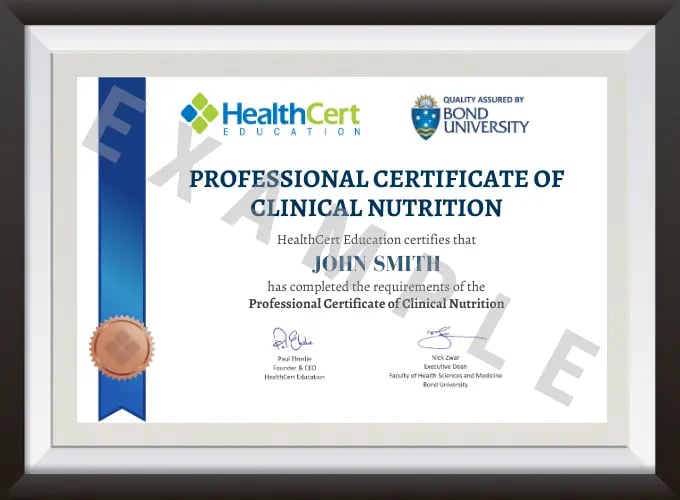In this webinar and Q&A, solicitor and former regulator David Gardner provides exclusive insights...

Learn the role of therapeutic diets in the treatment of chronic illnesses and nutritional disorders.

This course teaches the foundations of dietary guidelines and how they can be applied in general practice to better manage medical conditions.
- This course is perfect for practitioners with no to little training in this area.
- Learn key nutrition assessment techniques and intervention strategies.
- This course is for medical doctors, International Medical Graduates, registered nurses, and degree-qualified health professionals.
- CPD-accredited and university-assured.
You might also be interested in the Primary Certificate of Medical Nutrition and Chronic Disease.
Fulfils 50 hrs for medical professionals in Australia*
100% online
$1595
Special rates available
93 hrs
Self-paced
*provided an outcome measurement activity with a minimum of 5 hours is completed.

- Provide patients with comprehensive nutrition guidance throughout pregnancy, fertility, and lactation.
- Effectively manage gut microbiome issues with the use of pre-biotic and pro-biotic treatments.
- Move beyond six-minute medicine and improve patient outcomes with comprehensive healthcare plans.
- Offer nutrition counselling in your practice to meet growing patient demand for alternative treatment options.
Get unlimited access to all course content, additional learning materials, ongoing post-course support, and more.
This module provides a comprehensive overview of the Australian Dietary Guidelines (ADG) and the Australian Guide to Healthy Eating, and how these guidelines lead to smarter choices and healthier lives, guides policy and informs industry. Nutrient reference values and the link to food choices and chronic disease is highlighted. Recommended servings are listed for each of the five major food groups. The module compares the Australian guide with international dietary guidelines. A case study is presented examining patient food consumption and suggests better food choices to meet the patient’s goals. References and guides are presented throughout the course.
This module focuses on comparing and evaluating current popular diets against the Australian Dietary Guidelines. The description and pros and cons of popular diets including paleolithic (paleo) diets, ketogenic diet, intermittent fasting, gluten-free and ‘I Quit Sugar’ diets are discussed. The course then focuses on distinguishing the credible, evidence-based facts of nutrition information against unreliable nutrition myths to ensure patient safety in primary care. The organic vs non-organic, coconut oil usage, green juices and smoothies are discussed. Common red flags and a list of trusted sources are provided.
Athletes’ nutritional needs are principally determined by their training load and body mass. This module focuses on key nutritional priorities for athletes, safe and effective supplement options and nutrition priorities to maximise daily training performance, manipulate recovery and maintain immune function. Planning nutritional requirements for competitions and understanding athletes at risk of nutritional deficiencies are discussed. A case study of a triathlete reinforces learning. Timing of daily dietary intake including carbohydrate and protein guidelines, and barriers to fuelling/refuelling are included. Relative energy deficiency in sport (RED-S) and the potential consequences of RED-S are discussed including the stages of iron deficiency, RED-S assessment tools, and return to play guides. Muscle protein balance after exercise is considered including guides. Plant based protein supplements and guides to strategic eating to promote muscle protein synthesis are detailed. Expert assistance is strongly advised before supplement use. The course includes Information on supplements, sports foods and drinks.
This module provides an overview of the role of nutrition and lifestyle choices for optimising health at all stages of pregnancy. A case study is used to inform about the role of nutrition for conception and fertility. Lifestyle choices including key nutrients for pre-conception and optimising fertility are suggested. The patient case then moves to nutrition through pregnancy and addresses nausea and vomiting, and how a healthy diet reduces outcome risks for mother and infant including key nutrients and foods to avoid. Lifestyle considerations through pregnancy are outlined. The case study then moves to lactation post-partum and stresses the importance of healthy nutrition for lactation/promoting lactation and includes foods to avoid. Management plans and evidence-based practice guidelines are suggested at each stage. Supplements in pregnancy are mentioned and the course concludes with summarising practical nutrition considerations in pregnancy.
This module outlines the role of nutrition for optimising health outcomes for infants, toddlers and young children. It includes nutrition guidelines, breast milk and formula feeding, introduction to solids and family foods, and practical considerations like fussy eating, faltering growth, weight issues and constipation. Australian dietary guidelines for children and adolescents are outlined including infant feeding guidelines and principles of healthy eating. Assessment of breastfeeding adequacy, choice of formula, introduction to solids, allergy prevention and inappropriate feeding practices are included. The second section discusses fussy eating and food refusal, practical advice, avoidant restrictive food intake disorder (ARFID) and faltering growth. Expected growth and weight gain assessment guides are provided together with practical nutrition advice. The areas of childhood obesity and constipation in childhood include resources, guidelines and possible contributing factors.
This module defines food allergies, allergy prevention and dietary advice during pregnancy and infancy. Worldwide infant feeding guidelines for prevention of allergies and infant introduction to foods guidelines are included. Determining food allergy vs intolerance, sensitization vs tolerance and symptom history suggestive of lgE and non-lgE are discussed with supporting clinical images. Nutritional information regarding the management of infants and children with suspected food allergies is addressed including anaphylaxis reactions and eczema conditions. The role of the GP for referral and testing options for allergic reactions is included. Common and less common food allergens are described including cross reactivity and co-reactivity. Cow’s milk allergy, food protein induced enterocolitis syndrome and eosinophilic oesophagitis are discussed in detail. The course concludes with outlining food intolerances including pharmacological food chemical reactions, artificial and natural food chemicals.
The first section of this module outlines the main functions of the gut microbiota, its significance for gut health and factors that affect its composition. Factors that affect gut microbiota include delivery mode, diet, age, disease and medications. The gut microbiota interacts with the body including the immune and nervous systems. Short term consumption of different diets alters microbial community structure and gene expression.
The second section covers the appropriate use of specific prebiotics and probiotics in the treatment of irritable bowel syndrome (IBS) and functional constipation. Probiotics and prebiotics are explained including food sources for both. The mechanisms and effect on the gut microbiota are outlined. Evidence based research and guidelines supports the course content.
This module commences with discussing normal vs pathological ageing, the physiological changes of ageing and how nutrition is one of the major determinants of successful ageing. Nutrient, vitamin and mineral absorption is discussed along with deficiencies in these areas. Recommended dietary intake guides are presented including the impact of medications and polypharmacy, and pharmacokinetic changes over the ageing process. The relationship between ageing, malnutrition and polypharmacy is discussed including the relationship between medication and nutrient interactions. Unit two presents two comprehensive case studies that detail observations, history taking, investigation choices and presenting symptoms and signs. Management strategies for each case include the medication/nutrient relationship, statin induced symptoms and key learnings. Early access to appropriate nutrition care assists in the journey of successful ageing and quality of life.
This module defines malnutrition and includes an overview of the malnutrition burden and the prevalence of this condition in older adults. It recognises that ageing is associated with increased multi-morbidity and that a significant number of older adults may not be able to shop for food and prepare meals. It focuses on the implementation of nutrition screening and assessments with validated screening tools including the Malnutrition Screening Tool, the Mini Nutrition Assessment and the Malnutrition Universal Screening Tool plus others, to identify signs and symptoms associated with malnutrition. The Global Leadership Initiative on Malnutrition consensus diagnostic criteria is included. Common nutrition interventions and strategies used by GPs are discussed including the ESPEN Geriatric Guidelines and the importance of minerals and water in geriatric care. The course concludes with a case study to reinforce learning.
If you're not interested in pursuing a full certificate in this field but simply want to enhance your skills in specific topics covered in this course, you can access the content of this and other courses for a flat fee of $83 per month (paid annually) within HealthCert 365.

Bond University
Associate Dean of Research, Bond University
Professor Liz Isenring is an Advanced Accredited Practising Dietitian passionate about improving the quality of life of patients and their carers via evidence-based nutrition. Liz is Head of Program for the Master of Nutrition and Dietetic Practice, and the Associate Dean of Research for the Faculty of Health Sciences and Medicine at Bond University. She is recognised internationally as an expert in nutrition during treatment for cancer and for older adults. Liz has held several leadership positions including in AuSPEN, Dietitian Connection and MASCC, has published over 130 peer-reviewed papers and received more than $3 million AUS in research funding.

Associate Professor Gregory Cox is a Fellow of Sports Dietitians Australia (SDA) and an Accredited Practising Dietitian. He worked at the Australian Institute of Sport for 20 years and is currently the Nutrition Lead for Triathlon Australia and Paddle Australia. In 2016, Greg was the Nutrition Lead for the Australian Olympic Team at the Rio Olympic Games. He currently works at Bond University as an Associate Professor within the Nutrition and Dietetics program alongside his consultancy work in elite sport.
He is committed to making a difference within his daily work, be it teaching undergraduate or graduate students, working with elite athletes and coaches or undertaking applied research in sport and the wider nutrition field. He publishes original research, has written sports nutrition books and book chapters alongside countless sports nutrition periodicals. He loves travel, for work and holidays and regularly heads overseas for training camps, conferences, major sporting events or for his own holidays chasing the snow and waves!! He is a lifelong athlete and has maintained a competitive spirit in Triathlon and Surf Life Saving. Given his skill in poaching fresh, local eggs, he has often discussed the possibility of opening a restaurant with his son, Sebastian based on this theme - O for Awesome!!

Senior Research Fellow
Senior Research Fellow,
Griffith University
Early Career Fellow, NHMRC
Associate Editor, Australian Journal of Primary Health
Executive Committee Member, Australasian Association for Academics in Primary Care
Dr Lauren Ball’s vision is that all Australians are supported by a health care system that allows them to reach their full potential in life. This will be achieved by making nutrition a prominent part of the ongoing care they receive in general practice – the first point of contact with the health care system.
Lauren has worked with community members, health professionals, education providers and professional bodies to conduct research on how patients can be better supported in general practice to eat well. She implements interventions and programs so that general practitioners, nurses, dietitians, nutritionists, pharmacists and other health professionals feel confident in nutrition and have the skills to best meet patients' needs. She also works with Primary Health Networks to better understand how primary care services can be reoriented to put nutrition and other lifestyle behaviours at the forefront of the health care system.
Lauren has published over 100 peer-reviewed scientific articles and attracted over $1 million in research funding from government bodies, non-government organisations and philanthropic foundations. She is a Senior Research Fellow at Griffith University and an NHMRC Early Career Fellow. She is also an Associate Editor for the Australian Journal of Primary Health and Executive Committee Member of the Australasian Association for Academics in Primary Care.

Research Associate, Department of Nutritional Sciences, King’s College London, UK
Dr Eirini Dimidi is a nutritionist and registered dietitian since 2011. She has been awarded a PhD from King’s College London where she investigated the symptomatic, physiological and microbiological effect of probiotics in people with constipation. In 2016, she was appointed as a Research Associate at the Department of Nutritional Sciences, King’s College London, where she is undertaking several research projects on the impact of nutritional interventions (fibre, probiotics, prebiotics, low FODMAP diet) in people with functional bowel disorders. Other research projects include investigating the effect of diet on the gut microbiota and gut health, as well as exploring patients’ perceptions of gut diseases. She has published in several peer-reviewed nutrition and gastroenterology journals and has presented her work in national and international conferences.

Dr Ingrid Hickman is a Principal Research Fellow with the Department of Nutrition and Dietetics at the Princess Alexandra Hospital and the Mater Research Institute-UQ in Brisbane, Australia. Ingrid’s work specialises in investigating the metabolic factors that contribute to obesity-related chronic disease, particularly the role of diet and exercise as potential treatment options for chronic liver disease.
Ingrid collaborates nationally and internationally with multidisciplinary teams to deliver scientifically robust evidence for better management of obesity-related disease. The focus of her research team is to translate medical research findings into improved evidence-based practice for clinicians treating people with obesity-related chronic disease.

GradDipClinPharm, GCHEd, CertIVTAE, Adv Prac Pharm, FACP, FPS, MSHP
Assistant Director of Pharmacy (Practice and Development), Mater Health
Associate Professor of Pharmacology, Bond University
Dr Treasure McGuire is a passionate medicines information pharmacist, pharmacologist, educator and researcher. She is an Assistant Director of Pharmacy (Practice and Development), Mater Health, Brisbane and holds two senior conjoint academic appointments between Mater, the School of Medicine, Bond University and School of Pharmacy, The University of Queensland (UQ). She is also currently national president of the Australian College of Pharmacy.
As Associate Professor of Pharmacology, Bond University, Dr McGuire aims to transform medical students from ‘doctor as scientist’ to ‘prescriber ready clinicians’. For her work in education at UQ, she was a member of the Postgraduate Clinical Pharmacy Program Team that received the 2016 UQ Faculty of Health and Behavioural Sciences Award for Programs that Enhance Learning (APEL) and a 2017 UQ Commendation for these programs.
Dr McGuire collaborates with academic GPs in patient centred research, in the domains of medicines information, evidence-based practice, medication safety, reproductive health and complementary medicines.

Academic, Bond University
Dr Kate Morgan has been an academic with Bond University since 2012. Her teaching with dietetics students has focused on food science and nutrition, and its application across dietetic practice. This has involved leading future dietitians on culinary investigations in the food lab as well as informative paddock-to-plate expeditions outside the university.
Kate recently completed her PhD in dietetics education, taking a national approach to exploring key stakeholders’ perspectives on dietetics workforce preparation and preparedness. Through her PhD, Kate authored six peer-reviewed publications and presented the findings of her research at conferences both nationally and internationally.
Prior to academia, Kate was a dietitian in the corporate sector. This involved working with multinational companies to enhance the nutritional profile of their products while maintaining palatability, meeting business needs and effectively communicating credible nutrition information to consumers.
Kate has been an Accredited Practising Dietitian and member of the Dietitians Association of Australia since 2008.

Accredited Practising Dietitian and Senior Teaching Fellow, Bond University
Peta Paterson is an Accredited Practising Dietitian and Senior Teaching Fellow at Bond University. Her teaching focuses on community and public health nutrition issues and its application to improving the health of the population. Prior to academia she has worked as a dietitian in the general practice setting supporting patients to achieve optimum health through nutrition. She has also spent over 10 years as a Senior Public Health Nutritionist with a primary focus on the health of mothers, infants and children. She has been a member of the Dietitians Association of Australia since 2001.

Study at your own pace and to your own schedule. Interactivity, discussion, and feedback opportunities are included.

Easily meet your CPD requirements and gain valuable skills – all in one place for $83 per month.
$1595
*provided an outcome measurement activity with a minimum of 5 hours is completed.
Bundle two courses and save 5%, or three courses and save 10% upon enrolment.
Talk to us about deferred payment options, registrar scholarships and special rates.


The nutritional courses via HealthCert Education have taught me a lot about the Mediterranean Diet which is now benefiting a lot of my diabetic patients and those with weight issues!
Dr J. Pouesi
Good, courses with excellent speakers. I particularly enjoyed the case study scenarios which helped to integrate the knowledge gained.
Dr A. Tucker
This is the pathway to improve your confidence and evolve into the GP you aspire to be.
Dr S. Shinwari
HealthCert courses have become the standard by which you gauge all others.
Dr K. Abolarinwa
| RACGP Activity Number | ACRRM Activity Number | Activity Title | Education Hours | Performance Hours | Outcome Hours | ||
|---|---|---|---|---|---|---|---|
| 482836 | 31261 | Sports nutrition for high performance | 482836 | 31261 | 4.5 | 6 | 0 |
| 482814 | 31259 | Gut microbiome: Pre- and pro-biotic treatments | 482814 | 31259 | 4.5 | 6 | 0 |
| 480514 | 31248 | Busting common nutrition myths and fads: Superfoods, paleo, organic and other popular diets | 480514 | 31248 | 4.5 | 6 | 0 |
| 482245 | 31254 | Pregnancy: Complete nutrition guide for fertility, pregnancy and lactation | 482245 | 31254 | 4.5 | 6 | 0 |
| 480493 | 31246 | How to use Australian and international dietary guidelines to guide treatment | 480493 | 31246 | 4 | 6 | 0 |
| 485089 | 31265 | Childhood nutrition | 485089 | 31265 | 4 | 6 | 0 |
| 485109 | 31268 | Ageing, medication and nutritional management | 485109 | 31268 | 4.5 | 6 | 0 |
| 485116 | 31269 | Food allergies and intolerances | 485116 | 31269 | 4.5 | 6 | 0 |
| 480546 | 31251 | Malnutrition in the older adult | 480546 | 31251 | 4 | 6 | 0 |
| 859416 | 33468 | Nutrition and malnutrition in aging and older adults Outcome Improvement Activity | 859416 | 33468 | 0 | 0 | 8.5 |
| Total hours | 39 | 54 | 8.5 | ||||
View the CPD Hours for all HealthCert Education activities.
The purpose of outcome measurement activities is to improve your clinical confidence in managing an identified learning gap. Outcome measurement activities are not a requirement of our Professional Certificate of Advanced Certificate courses; they are a requirement for Australian CPD purposes.
HealthCert Education provides a variety of outcome measurements activities to suit your needs:
The Professional Certificate of Clinical Nutrition is tailored for medical practitioners who wish to gain a better understanding of nutrition management in order to improve patient outcomes, especially for those patients with conditions commonly seen in general practice.
The course is suitable for medical doctors, degree-qualified nurses, degree-qualified health professionals, and International Medical Graduates. The course assumes no prior knowledge or training in the field.
Participants do not have to pass an IELTS test but, as the courses are delivered in English, proficiency in listening, reading and writing English is assumed.
Participants will require access to a computer/laptop, an internet connection and a basic level of technology proficiency to access and navigate the online learning portal.
Professionally recognised qualifications and prior studies may be recognised for entry into this course if the learning outcomes match exactly. Please ask a HealthCert Education Advisor for an individual assessment of your prior qualifications and experience.
This certificate course meets the minimum 50 hours CPD annual requirement across all three mandatory CPD activity types, provided an outcome measurement activity with a minimum of five hours is completed. You may use an optional HealthCert outcome measurement activity or develop your own.
Outcome measurement activities are not a requirement of Professional or Advanced Certificates.
Upon successful completion of the course requirements, course participants will receive the Professional Certificate of Clinical Nutrition and CPD hours.
This certificate course:
To learn more about the delivery of certificates in Australia and overseas, please visit our FAQs.
Certificate Pathway
This course is the first stage of the two-part Certificate Courses in Clinical Nutrition. The education pathway is Professional Certificate of Clinical Nutrition and Advanced Certificate of Clinical Nutrition.
You might also be interested in the Primary Certificate of Medical Nutrition & Chronic Disease.
This organisation is an RACGP-accredited CPD provider under the RACGP CPD Program.



Don't see your question? Explore other faqs or talk to us.
Fees will vary based on the program and study option selected (fully online vs online + optional practical workshop). Payments can be made upfront or in monthly instalments. Special rates and various payment options are available. GP registrars and doctors in training enjoy a scholarship of up to $500. Talk to us to learn more.
Completion of any HealthCert course or attendance at an event will enable you to access the HealthCert Alumni Program which includes:
HealthCert Education is pleased to issue digital credentials for alumni. Digital credentials are a permanent online record of your successful completion of a HealthCert course and are issued to all course participants in addition to PDF certificates. If you are based in Australia, you also have the option to order a hard copy of your digital certificate for a small additional fee.
The recommended study duration of this certificate course is 93 hours, which includes study of the pre-course activities and readings, online lectures, live tutorials, and online assessment. This self-paced course offers the flexibility of 100% online study in your own time, at your own pace, in your own home or office, with no mandatory face-to-face requirements. You are not required to be online at specific times but can view and replay video lectures at your convenience.
All HealthCert courses meet World Federation of Medical Education standards. This certificate course qualifies for CPD hours from the Royal Australian College of General Practitioners (RACGP) and the Australian College of Rural and Remote Medicine (ACRRM) in Australia. It is recognised by the Royal New Zealand College of General Practitioners (RNZCGP) in New Zealand. It is recognised by the Hong Kong College of Family Physicians (HKCFP) in China. It is a self-submitted activity in Dubai and the United Kingdom. It is a self-submitted activity through the College of Family Physicians in Canada. If you live or work outside one of the above-mentioned countries, please contact us on admin@healthcert.com to discuss whether this course can be recognised in your country.

In this webinar and Q&A, solicitor and former regulator David Gardner provides exclusive insights...

This week's case discussion, submitted by Dr Heather Lawson, features a 64-year-old female patient...

Mood changes in the postpartum period are extremely common, ranging from mild and transient “baby...
Want to stay up-to-date with the latest case studies, podcasts, free video tutorials and medical research articles pertinent to primary care?
Our Education Advisors can assist you with any queries and tailor our education pathway to suit your current expertise, interests and career goals.